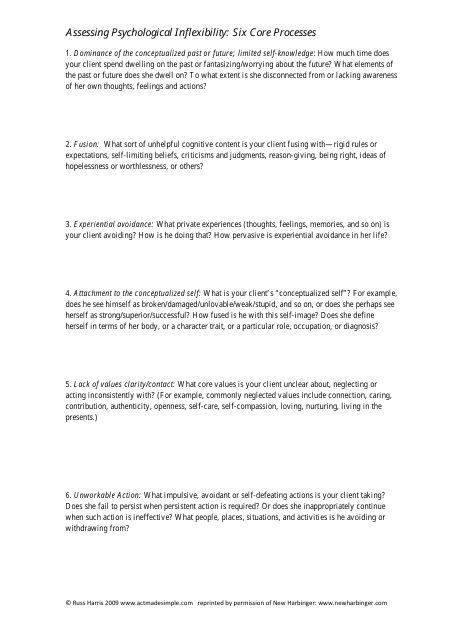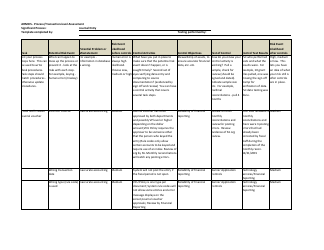Psychological Inflexibility Assessment Template - Six Core Processes - Russ Harris
The Psychological Inflexibility Assessment Template - Six Core Processes by Russ Harris is designed to assess an individual's level of psychological inflexibility. Psychological inflexibility refers to difficulties in adapting and responding effectively to life's challenges. This assessment template helps identify areas of stress and potential barriers to well-being, allowing individuals and healthcare professionals to develop targeted interventions to improve psychological flexibility.
FAQ
Q: What is the Psychological Inflexibility Assessment Template?
A: The Psychological Inflexibility Assessment Template is a tool used to measure psychological inflexibility.
Q: What are the Six Core Processes in the assessment?
A: The Six Core Processes are cognitive fusion, experiential avoidance, lack of contact with the present moment, the self-as-context perspective, lack of values clarity, and inaction or avoidance of values-based action.
Q: What is cognitive fusion?
A: Cognitive fusion refers to the tendency to believe or become entangled with our thoughts, and to treat them as objective truths.
Q: What is experiential avoidance?
A: Experiential avoidance involves trying to avoid or escape from unwanted thoughts, emotions, memories, or physical sensations.
Q: What is lack of contact with the present moment?
A: Lack of contact with the present moment refers to being stuck in past or future-oriented thinking, rather than being fully present in the here and now.
Q: What is the self-as-context perspective?
A: Self-as-context perspective involves recognizing that our thoughts and emotions are transient experiences that come and go, and that we are the observing self that remains constant.
Q: What is lack of values clarity?
A: Lack of values clarity refers to not being aware of or not living in alignment with our core values and what is truly meaningful and important to us.
Q: What is inaction or avoidance of values-based action?
A: Inaction or avoidance of values-based action refers to not taking action that is in alignment with our values and what is truly important to us.


